Going for Gold: Elana Meyers Taylor & Nico Taylor
January 10th, 2023 by Global Down Syndrome Foundation
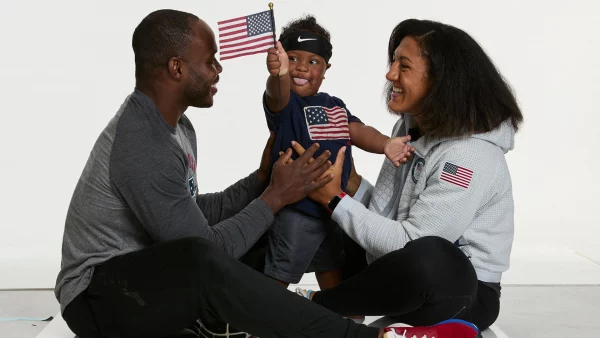
From Down Syndrome World Issue 3, 2022
ELANA MEYERS TAYLOR, has collected numerous inspiring accolades throughout her life. She is perhaps most known for making history in the 2022 Beijing Olympics, receiving her fifth medal (she has three silver and two bronze) in bobsledding. Taylor is the most decorated black Olympic winter sports athlete and the most decorated U.S. Olympic bobsledder of all time. This is an impressive feat for anyone to accomplish, and Elana did it all while raising her beautiful son, Nico, who has Down syndrome.
Like most children, Elana had big dreams for her future at a young age. Since seeing the 1996 Summer Olympic Games in her hometown of Atlanta, Georgia, she knew she wanted to be the one standing on the podium one day. A renaissance athlete, she participated in sports throughout her childhood and well into adulthood. As a kid, she played softball, basketball, track & field, and soccer, all with the intention of becoming an Olympic athlete one day. She went on to play collegiate softball at George Washington University and played professionally after college as well. With all this work building toward her dream of becoming an Olympian, Elana felt immense pressure during her tryout for the US Olympic Softball team. “I put the weight of the world on me and just completely choked.” Taylor stated, “I just couldn’t handle the pressure and thought it was going to be my only chance to live my dream.” This setback allowed her to set her sights on a new sport to carry her to the Olympics.
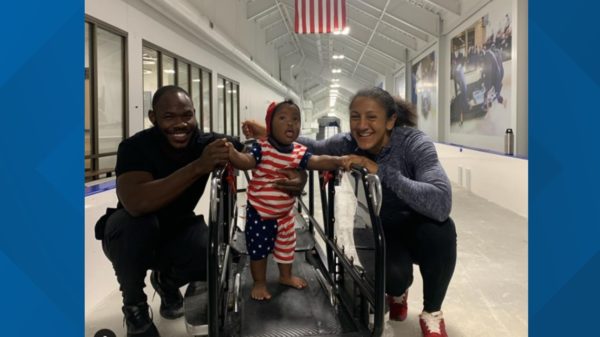
Taylor’s parents, Eddie and Janet Meyers, suggested she check out bobsledding as an option, and even though she knew nothing about the sport, she decided to give it a shot. Her natural athleticism propelled her through the first round of trials where she could then hone her technical skills to make her a strong competitor in bobsledding. After competing in the U.S. National Team trials and World Cup tour, she qualified to race in the World Championship race within her first year as a brakeman.
Her triumph in the World Championship races as a brakeman allowed her to start racing in the front seat as a driver, and from there she began her legacy as a bobsled icon, making her debut on the U.S. bobsled team at the 2010 Vancouver Olympics. She has continued to compete in the two-woman and Monobob races at the Olympic level, and even qualified to race on the men’s four-man bobsled team!
Elana’s story of success in making her way to the Olympics and earning such honorable titles along the way is admirable on its own, but her work does not stop there. Elana is a devoted advocate for women of color competing in the Olympics and uses her 5-medal status to get her foot in the door and initiate change at a higher level. “Other people like to scream and shout and, you know, take to social media and stuff like that. That’s not really my cup of tea.” She prefers to do her work behind the scenes by having these difficult conversations about equity for women of color in sports with the higher-ups in the Olympic committees, pushing for that positive change. It is clear, that Elana has a passion for advocacy and creating space for marginalized groups to excel, and this passion grew even stronger with the birth of her first son, Nico.
Becoming a Mother and an Olympic Athlete
Amid the rise of her Olympic career, Taylor and her husband, fellow Team USA bobsledder Nicholas Taylor, became pregnant with their first child, Nico, who was born at the start of the COVID-19 pandemic in 2020. Following her silver medal-winning run at the 2018 Winter Olympic Games in Pyeongchang, Taylor was unsure if she wanted to compete in another Olympics. She was already a 3-time medal winner and was feeling content with the progress she has already made in her bobsled career. “You can only be driven so much by a gold medal,” stated Taylor. However, the news of her pregnancy sparked a new kind of motivation in Taylor that she did not quite expect. Competing at the Olympic level while navigating pregnancy and becoming a first-time parent was a new challenge that she was determined to take on.
Elana and her husband continued training throughout her pregnancy, adapting a garage in their apartment building into a home gym to get their training schedule back on track. Less than 6 months after Nico was born, Elana was already working towards making the U.S. National Team and eventually competing in the 2022 Winter Olympics. Nico was along for the ride every step of the way, traveling to Lake Placid with his mother to train and cheering her on from the sidelines at competitions across the globe.
Wherever Elana was, Nico went too. She wanted to show the world that just because she is now a mother, let alone a mother of a child who is differently-abled, she is still a force to be reckoned with in her sport. Her new-found motivation from her son and desire to prove to the world that motherhood does not have to thwart a lifetime of progress drove her to the 2022 Winter Olympics in Beijing, where she earned a silver medal in the women’s Monobob event and bronze in the women’s 2-person bobsled. Now, as a 5-time medalist in bobsledding, her goal is to use her status to uplift and advocate for other women in sports—especially women of color—to fight for equality and serve as a beacon of hope that change is possible.
Taylor’s Experience Raising a Child with Down Syndrome
For most people, having a child at the start of a global pandemic, receiving the Down syndrome and significant hearing loss diagnoses, and a tiresome, eight-day extended stay in the NICU, would be overwhelming. But Elana and Nicholas Taylor did not falter for a second. The Taylors’ athlete mindset helped them make a plan of action to provide Nico the best care possible while still being able to train for and compete in the upcoming 2022 Olympics.
Taylor brings Nico along with her to all her events to show that children with Down syndrome can live normal, happy lives, and more importantly, be an example to her son that you can go out and achieve your goals regardless of what the world is telling you. “We were like, okay, now the rest of the world’s going to tell him he can’t achieve stuff,” Taylor stated. “The rest of the world’s going to tell him ‘No’. Just like they tell female athletes ‘No’. Or they tell moms ‘No, you can’t achieve certain things and you can’t do certain things.’ I want to be there for him and make sure he knows the opposite is true.” Taylor never let skepticism steer her away from accomplishing her goals, and now hopes to pass on that unwavering mindset to Nico.
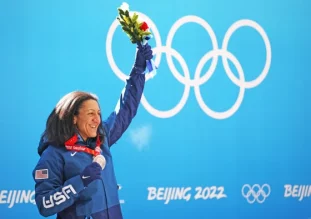
Many people formulate incorrect assumptions about individuals with Down syndrome based on outdated stereotypes. Due to advances in research, medical care, and inclusion, an increasing number of adults with Down syndrome in the U.S. are going taking post-secondary classes or going to college, getting jobs, playing sports, working, getting married and living semi-independent or independent lives.
As a mother, Taylor hopes that her son can see the obstacles she has overcome in her career to inspire him to chase his dreams without hesitation. “If I could advocate for anything to the world, it is to show that our kids have worth, that they can be important and valuable members of our society, and that the people with Down syndrome in our lives should have the same respect and opportunities as anyone else.”
Taylor’s Advice to Families of Individuals with Down Syndrome: “You Are Much Stronger Than You Think”
Parents of children with Down syndrome have some extra hurdles to navigate throughout their child’s life, but these are not infeasible challenges. Therapy, doctor visits, and assisting with daily living tasks can be daunting responsibilities but are not unmanageable compared to the needs of a typical child. Taylor encourages families who either currently have or are about to welcome a child with Down syndrome into their lives to look past the negativity that is so often thrown at them from the outside world and to know that living with a person with Down syndrome is a gift in itself. “I think all of us have that ability inside of us,” Taylor mentions, “just most of us don’t realize we do”.
Taylor and her husband go above and beyond to provide the best for Nico, and when faced with challenges that seem impossible or overwhelming, they are reminded that Nico is a child like any other, and their job as parents is to simply love and support him unconditionally. “Just trust your own abilities and know that you are much stronger than you think.” The Taylors’ unwavering love for Nico has helped them face these new circumstances head-on and accept that while their situation is not a typical one, they can still achieve their goals as a family. Much like Taylor’s unexpected path to the Olympics—averting her original plans of playing softball and taking on a completely new sport—her experience raising Nico has brought her and her family more gratification and joy than they ever could have imagined.
Advocating for a Brighter Future for those with Down Syndrome
Great strides have been made to reverse the harmful, outdated assumptions about people with Down syndrome in society, but there is still a lot of work to do. Many health and medical concerns associated with Down syndrome still do not have adequate research and funding dedicated to them. At GLOBAL, the mission is to significantly improve the lives of people with Down syndrome through research, medical care, education, and advocacy. In 2021, Elana Myers Taylor attended the GLOBAL AcceptAbility Gala in Washington DC and inspired the audience with her work on inclusion and with her powerful speech made with Nico in her arms.
She is clearly someone who leads by example and works to open doors for individuals who are differently-abled in their communities. At the event Taylor announced that she was proud to be an official GLOBAL International Spokesperson joining the ranks of Quincy Jones, Jamie Foxx, John C. McGinley, Frank Stephens, Kyra Phillips, Beverly Johnson, and Amanda Booth. As an International Spokesperson and member of GLOBAL’s Champion Advisory Board, Taylor will work every year to advocate in Washington, DC, her hometown of Atlanta, and around the world.
“I’m so honored and excited to be part of an organization that in a very short time has succeeded in advocating for increased federal Down syndrome research funds,” Taylor says. “We need to have both sides of the aisle advocating for our kids and to come up with a plan to address lifespan and health disparities for black people with Down syndrome as well. Our kids deserve equity, respect, inclusion, and the right to live safe, happy and productive lives.”
Clearly the Down syndrome community has a formidable ally and a new leader in Taylor who understands how to work hard and create real change.
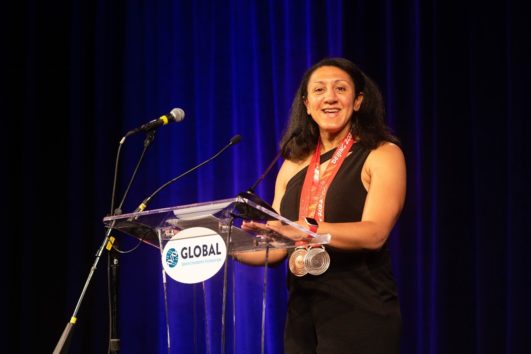
Like this article? Join Global Down Syndrome Foundation’s Membership program today to receive 4 issues of the quarterly award-winning publication, plus access to 4 seasonal educational Webinar Series, and eligibility to apply for Global’s Employment and Educational Grants.
Register today at downsyndromeworld.org!
Collettey’s Cookies: The Taste of Sweet Success
October 28th, 2022 by Global Down Syndrome Foundation
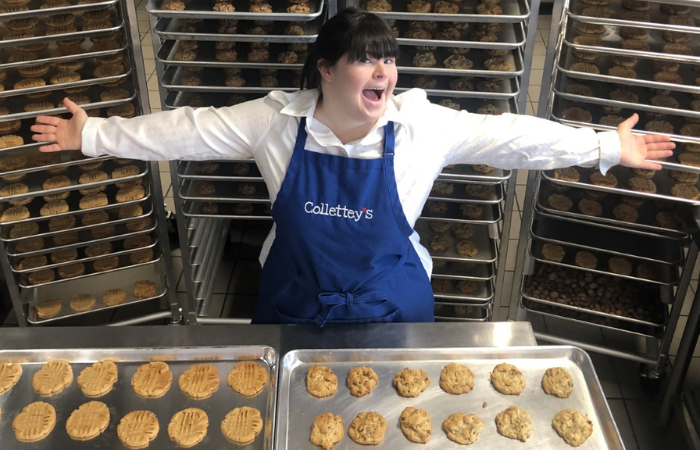
From Down Syndrome WorldTM 2022 Issue 2 of 4, written by Emmy Award winner Hanna Atkinson
The Taste of Sweet Success
 This article was published in the award-winning Down Syndrome World™ magazine. Become a member to read all the articles and get future issues delivered to your door!
This article was published in the award-winning Down Syndrome World™ magazine. Become a member to read all the articles and get future issues delivered to your door! What does success look like?
Let me introduce Collette Divitto, the talented chef and owner of the business she named after her skills, Collettey’s Cookies. Ironically, her idea for the business came after many job interviews and rejection letters. “I was tired of waiting on someone else to make my dreams happen, so I decided I’d make them happen for myself,” says the outstanding 31-year-old entrepreneur.
Collette has always loved baking. In fact, she started creating her masterpieces at the young age of four. Through the years, she tweaked the recipes based on her family’s feedback until eventually she had it down to a science. As her cookies were gaining popularity amongst friends and family, Collette decided to try to sell them for the first time.
When she was in high school, Collette would bake healthy breakfast cookies and sell them in front of local gyms and stores. Her after school gig was small, but successful. “I’ve always been a hard worker, but when I was making my own money working hard, that felt really cool. I wanted to explore that more,” says Collette, who then closed down her cookie business in pursuit of college. She completed a 3-year program at Clemson University with a concentration on food and nutrition. While studying what she’s passionate about, she made sure to make time for all the other excitement that college life had to offer including making new friends, shopping, enjoying apartment life, and going to sports games and concerts, job responsibilities and bills. Collette’s college experience empowered her to feel confident in her independence – she was managing her own school and work schedule, paying her own bills, living on her own, and not relying on her parents.
Eager to apply her expanded culinary knowledge, Collette was disappointed when the traditional post-college job market did not reward her talents and experience with a great job. With the support of her mother, Rosemary, Collette started her own business, Collettey’s Cookies.
“I told Collette that because she’s an adult now, this business venture would need to be more sophisticated than her high school gig,” says Rosemary. “It was important for Collette to learn the whole business ownership process ,including registering the business, doing invoices, and lining up suppliers. She did a great job compiling research and figuring out everything that needed to be done.” And no, Rosemary did not need to teach Collette how to bake – that one is Collette’s specialty!
Running the Kitchen
As a business owner, Collette has a really busy schedule. She runs team meetings daily, where she outlines the team production goals and discusses each employee’s responsibilities. Collette is an expert at cookie preparation; her method ensures every batch of cookies turn out perfectly every time. Collette is passionate about providing thorough training to her employees and she loves giving cooking demonstrations. But the crew makes sure to have fun too! There’s a lot of laughing and smiling happening in the kitchen as they work.”
“I try to create a work environment that helps employees succeed. I encourage them to work hard and be happy.”
A key ingredient of Collette’s managerial style is providing strong support for her team. She is proud that her business hires people with special abilities and promotes the positivity of inclusion. Collette fights for these ideas, including traveling to Washington, D.C. to participate in government advocacy for fair employment policies like proper wages.
Collette welcomes her peers to join with her and encourages them to develop their personal skills. She developed Collettey’s Leadership Program that offers educational workshops on topics ranging from success in school to becoming an entrepreneur.
“Collete is a strong leader because she shares her real experiences with failure and success in hopes that her lessons will help others learn and grow,” says Rosemary. “It’s awesome to watch how people take notice when she begins to talk. They trust her insight, knowing her intentions are good and that she is seeking everyone’s best interest.”
Collette writes about her personal and professional struggles and how she dealt with them in her new book, “Collette in Kindergarten” which recently hit the shelves. The book is the first for an intended series of books that provide her unique perception growing up as a person with Down syndrome. Collette hopes each book will be helpful and positive. Her skills and determination were noticed and are spotlighted in the docuseries called “Born for Business” streaming on Peacock and CRAVE.
Despite Collette’s incredibly packed work schedule, she tries to make time for other hobbies she enjoys like travelling, swimming, tennis, watching movies and sports and evenings out with friends. Collette prioritizes time with family including her sister, Blake Ashley, and her brother, Steele. Rosemary says that they are a close-knit family and are very proud of Collette. When asked what Collette’s greatest strength is, Rosemary quickly said “confidence.”
To which Collette responded with this powerful statement: “No matter who you are, you can make a difference in the world.” Collette is a visionary using her success to impact lives. Now that is truly sweet success.
To learn more about this organization, visit https://colletteys.com/
Like this article? Join Global Down Syndrome Foundation’s Membership program today to receive 4 issues of the quarterly award-winning publication, plus access to 4 seasonal educational Webinar Series, and eligibility to apply for GLOBAL’s Grants.
Register today at downsyndromeworld.org!
GLOBAL’s Position Statement on Humanitarian Crisis in Ukraine
March 29th, 2022 by Global Down Syndrome Foundation
Global Down Syndrome Foundation has been following the developments and grave humanitarian crisis taking place in Ukraine. We are all deeply concerned for the men, women, children, elderly, and people with disabilities who are being forced to leave their homes due to the conflict and those who are still trying to escape Ukraine to neighboring countries.
In dangerous and confusing times such as these, people with disabilities are often overlooked and face greater risk of abandonment, violence, and even death. There are food and medication shortages, and people with disabilities are cut off from support services. The situation is dire.
GLOBAL is adding our voice to international efforts, alongside other Down syndrome and disability organizations from around the world, asking that the parties and governments involved in the conflict respect humanitarian and international rights laws, and we ask that Ukrainians with Down syndrome and other disabilities be prioritized for evacuation and humanitarian aid.
1% BETTER EVERY DAY
April 28th, 2021 by Global Down Syndrome Foundation
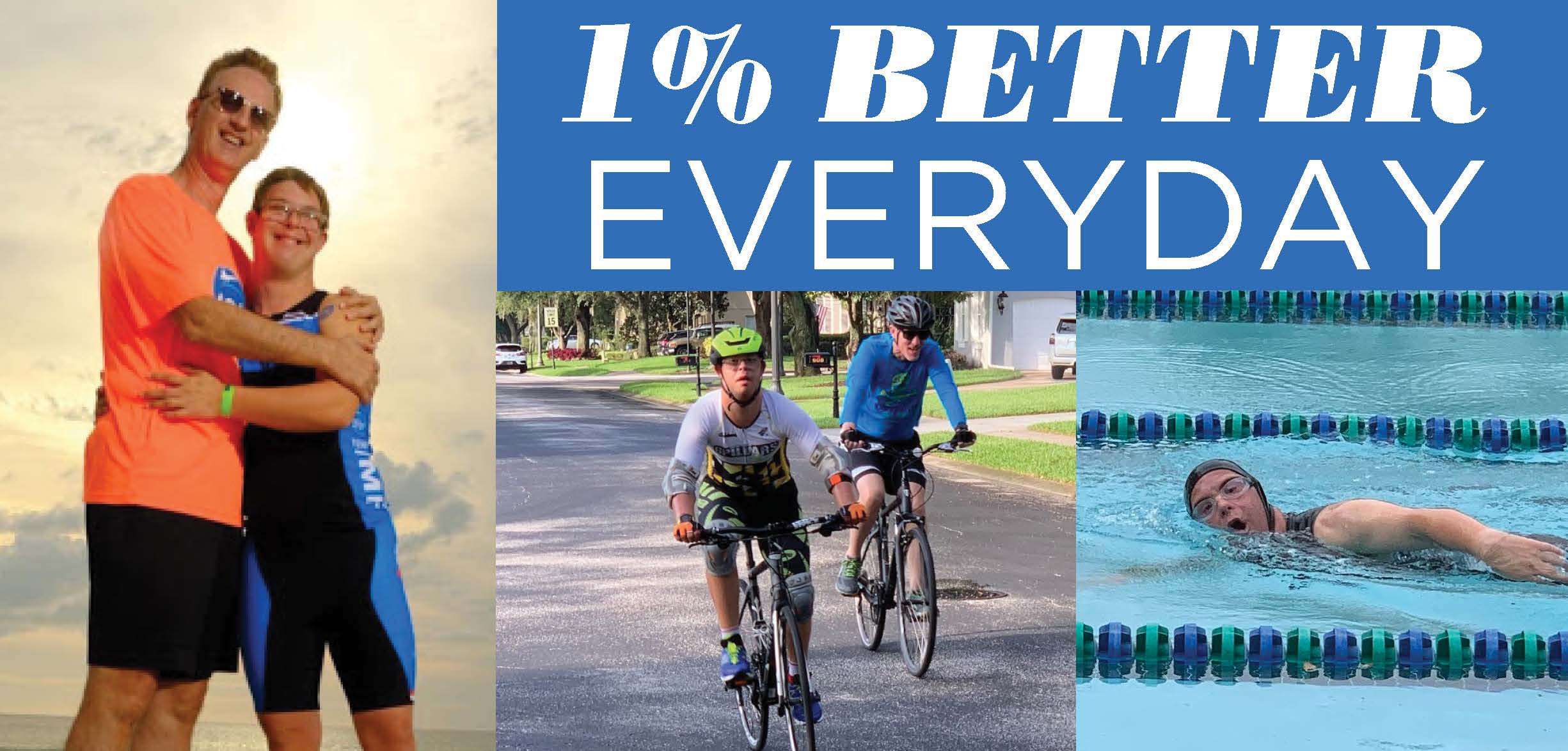
From Down Syndrome WorldTM 2021 Issue 1 of 4
WITH IRON WILL & DETERMINATION, FLORIDA ATHLETE MAKES HISTORY
 This article was published in the award-winning Down Syndrome World™ magazine. Become a member to read all the articles and get future issues delivered to your door!
This article was published in the award-winning Down Syndrome World™ magazine. Become a member to read all the articles and get future issues delivered to your door! WHEN MANY OF US HEAR THE WORDS “IRON MAN,” we might think of the rich Marvel hero in a flying suit. For the 21-year-old athlete, Chris Nikic, “Iron Man” means he can do anything he sets his mind to. In November of 2020, Chris became the first individual with Down syndrome to complete an Ironman triathlon competition, earning him a coveted spot as a GUINNESS WORLD RECORDS® holder as ‘First person with Down’s syndrome to complete an IRONMAN® triathlon.’
The Ironman consists of a 2.4-mile swim, a 112-mile bicycle ride, and a 26.22-mile run. In the world of triathlons, this is considered to be one of the most challenging one-day events. Chris made history by competing in and finishing the race, and serves as an inspiration to the Down syndrome community and the world.
An ambitious attitude, drive, and family support have been the driving forces to propel Chris to new and more extraordinary accomplishments.
“I want to be a world champ at something!” Chris added to his list of New Years’ Eve goals in 2018.
Chris and his father Nik did research and some soul searching to determine that the Ironman triathlon was the way Chris would accomplish that. Nik, who is also an athlete, was ready to train for, and compete in, the triathlon with his son.
Nik made sure Chris was ready to put in the work. “I told him, if you sit on the couch playing video games, you will never get your dreams,” says Nik. “But if you work hard to accomplish your goals, you can do an Ironman and become a motivational speaker.”
After Chris set his intention to compete in Ironman, there was no stopping him. Little did he know what would continue to unfold after successfully completing this intense race.
A FORCE TO BE RECKONED WITH
Chris trains with the mindset of becoming 1 percent better every day. “I built my core 1% at a time. A year ago, I started by doing one push up, one sit up, and one squat. Then every few days, I did a little more,” Chris tells. “Eventually, before Ironman, I was doing 200 of each plus weights, pull-ups, and other strength exercises.”
Chris trains from 3 to 8 eight hours per day, with some stretching and recovery in between. He runs, bikes, swims, and completes strength training four times a week. On the weekends, training is kicked into even higher gear, “I’ll put in 6-8 hours of training each day when I do my 100-mile bike rides, and 18-mile runs.”
Chris’ training is not just physical. His dedication requires a lot of mental strength training too. Chris maintains that anything is possible as long as he can get 1 percent better each day. This mentality helps him stay focused and enjo y his training more.
If Ironman training wasn’t already hard enough, Chris had t o deal with the threat of COVID-19. He admits that training during an unprecedented worldwide pandemic was more challenging, but he wasn’t going to let that get in his way. “There were no gyms to work out in, no lakes to swim or bike trails to ride on,” Chris explains. “So we found ways to train in my home, pool, and neighborhood. It was much harder and less fun, but we found a way to do it anyway.”
THE FOUNDATION OF COMMUNITY
Throughout his training process, Chris had great support from h is family, friends, and community organizations.
Chris and his dad Nik started with intensive training sessions, but when Nik got injured, he decided he was not going to compete in the race and shifted his efforts to being the best coach and cheerleader for Chris.
“Some days, it felt too hard, and I felt like I couldn’t do it,” Chris recalls. “But my dad kept reminding me of my dreams and how important it is to fight for your dreams.”
Chris joined a triathlon club and was paired with a special training coach through the Special Olympics. “My guides at Special Olympics, Simone and Dan, made it fun and helped me through my journey to compete,” Chris tells. “My family and friends were there every step of the way. I thank God for all the special angels he brought into my life.”
“Watching Chris cross that finish line with a huge smile on his face was a moment I will never forget,” says Patty, Chris’ mother. “Seeing your child accomplish something they have worked so hard for is something every parent dreams
of experiencing.”
Chris’ impressive athletic accomplishments have been recognized around the world. His story was featured in national media everywhere including outlets like ESPN, New York Times, Today Show, CNN, NBC, Sports Illustrated, and more.
Special Olympics named Chris a Champion Ambassador, invited him to compete in the USA games, and honored him with the Florida Hero award where he met the state’s governor Ron DeSantis. Ironman gave him the title of Global Ambassador and invited him to Hawaii for the next Ironman competition.
When asked how all of this feels, Chris responded with a simple “I am living my dream.”
HIS SPECIAL MESSAGE FOR THE WORLD
“People have been telling us our whole lives what we can’t do,” says Chris. “And I want to tell you to stop listening to those opinions because they are wrong. We are capable of so much more. Yes, we have disabilities, but we also have big abilities.”
Chris wants to share his experiences and message with the world. He is working on publishing a book this year and he has secured several public speaking events with companies like Dell and Microsoft.
To encourage other athletes in his community, Chris has also launched his own “1% Better Challenge” to promote Down syndrome awareness. The process is simple. Partner up with a sponsor (friend, family, coach), set a 30-day goal you want to achieve, and post your progress with your partner on social media.
“I want to inspire others the way that my community has inspired me. The inclusion revolution is real! Nothing is too big to accomplish or too challenging to do if you commit to being 1% percent better every day.”
Like this article? Join Global Down Syndrome Foundation’s Membership program today to receive 4 issues of the quarterly award-winning publication, plus access to 4 seasonal educational Webinar Series, and eligibility to apply for GLOBAL’s Grants.
Register today at downsyndromeworld.org!
Global Down Syndrome Foundation Raises Crucial Awareness At The First Ever Virtual Be Beautiful Be Yourself Fashion Show
November 19th, 2020 by Global Down Syndrome Foundation
The unprecedented virtual event was an overwhelming success which raised $1.9 million for
life-saving and transformative funds for Down syndrome research and medical care
Press Contacts:
Anca Call | acall@globaldownsyndrome.org | C: (720) 320-3832
Rejena Carmichael | rcarmichael@globaldownsyndrome.org | C: (240) 603-5494
DENVER, CO – November 19, 2020– This weekend, the Global Down Syndrome Foundation (GLOBAL) went virtual for the first time ever and raised over $1.9 million. Now in its 12th year, GLOBAL’s Be Beautiful Be Yourself Fashion Show is the largest fundraiser for Down syndrome in the world and has raised a cumulative $22 million.
Held virtually on Saturday, November 14, the Be Beautiful Be Yourself Fashion Show was a tremendous success. 2020 GLOBAL Ambassador Walt Snodgrass; Music Legend Quincy Jones; supermodels Beverly Johnson and Amanda Booth; award-winning actors John C. McGinley, brothers Matt Dillon and Kevin Dillon, Jeff Probst, Eric Dane, Zack Gottsagen, Jamie Brewer, Megan Bomgaars, Kevin Quinn (appearance arranged by Gotham Artists); Denver Broncos Von Miller, Brandon McManus, Justin Simmons, Jake Butt; Golfer Brad Hennefer; R&B power couple Ronnie & Shamari DeVoe; award-winning journalists Kyra Phillips and John Roberts; musician Sujeet Desai and more, were among those who rocked the virtual runway, which featured 25 beautiful models from 8 states and 3 countries who were introduced by their celebrity escorts. The show’s virtual format provided an extraordinary opportunity for people from across the U.S., and the world, to tune-in and join this inspirational and star-studded event. Full list of celebrity line-up: HERE
“It was an honor to emcee the event this year, and to see how all the pieces came together so magically,” says John C. McGinley, who is a GLOBAL board member and international spokesperson, and father to Max, who has Down syndrome. “It truly was the virtual event of the year!”
“We are so grateful to John C. McGinley, our models, celebrities, and donors that helped make our first virtual event a success,” says Michelle Sie Whitten, GLOBAL’s President and CEO. “With COVID we have had such a tough year working to protect people with Down syndrome who are high risk from the virus, and to help families who have been crushed by the economic impact. Despite all that, GLOBAL was still able to deliver on publishing the first medical care guidelines for adults with Down syndrome, advocate for increased NIH research funding, and support over 2,000 patients with Down syndrome. Sadly, this year we also tragically lost our GLOBAL Ambassador DeOndra Dixon so we’re navigating a lot of loss.”
Later in the evening the legendary music icon Quincy Jones presented his namesake awards, the Quincy Jones Exceptional Advocacy Awards, to this year’s winners, award-winning actress and Grey’s Anatomy star Caterina Scorsone and Spanish model Marián Ávila.
“Modeling, walking a runway, and being featured in advertising campaigns is important to me,” says Marián Ávila, who has modeled in New York Fashion Week and has been profiled in international publications including Vanity Fair. “It makes me feel self-assured and happy. And it is a platform for diversity and equity for people with Down syndrome and all people. I am so honored to receive this award – GLOBAL truly allows the world to see us, hear us, and respect us.”
The show paid a loving tribute to the late DeOndra Dixon who is the inspiration behind GLOBAL’s highest honor, the Quincy Jones Exceptional Advocacy Award. DeOndra tragically passed away last month. Music legend Quincy Jones himself introduced GLOBAL to DeOndra as one of the most articulate, irrepressible, magnetic people he had ever met. GLOBAL and DeOndra’s family have set up the “DeOndra Dixon Down Syndrome Research Fund” to focus on the often-neglected population of African Americans with Down syndrome. Anna and John J. Sie are generously matching $100K for this important research. See full tribute: HERE
“It means so much to our family to see DeOndra’s legacy make a difference for GLOBAL and the Down syndrome community that she inspired,” says Mr. George Dixon, DeOndra’s father. “DeOndra was an angel and a star. I know she is looking down on us, loving on us and watching over us. She is our angel.”
“DeOndra’s fund is so important to the Down syndrome community, especially the African American community. It will give us opportunities to better understand and correct the health disparities for African Americans with Down syndrome,” says Beverly Johnson, a GLOBAL international spokesperson and aunt to Natalie Fuller, a GLOBAL model who happens to have Down syndrome.
Another highlight of the evening were the heartfelt performances honoring those in the Down syndrome community who have battled COVID-19. The Fray’s Isaac Slade gave an exclusive performance of “How to Save a Life,” and Multiplatinum Artist Rachel Platten performed her iconic “Fight Song” and “Better Place,” which left the audience on their feet from the comfort of their own homes. The Ransom Notes shared their wonderful Folk-Americana-Bluegrass music all the way from Nashville and had everyone clapping. To end the evening, Multi-platinum artist and actor Phillip Phillips performed a heartfelt tribute in honor of DeOndra Dixon with a beautiful rendition of “Gone, Gone, Gone.” Rachel Platten and Phillip Phillips’ appearances were arranged through Gotham Artists.
Lou III and Jill Rotella from Omaha chaired the 2020 event – GLOBAL’s first virtual Be Beautiful Be Yourself Fashion Show. Past event chairs include Kacey Bingham and Brittany Bowlen, Peter Kudla, Anna and John J. Sie, Sharon Magness Blake and Ernie Blake, Ricki Rest, Nancy Sevo and Michelle and Tom Whitten. Other notables in attendance included past Global Ambassadors Chase Turner Perry, Kate Winfield, Sam Levin, Sophia Kay Whitten, Louis Rotella IV, Marcus Sikora, and Clarissa Capuano; and past Q-Award winners Tim Harris, Megan Bomgaars, Zack Gottsagen, Karen Gaffney, Sujeet Desai, Brad Hennefer, Jamie Brewer, and Frank Stephens.
Proceeds from GLOBAL’s Be Beautiful Be Yourself Fashion Show help underwrite life-changing and life-saving research and medical care at GLOBAL’s affiliates – the Crnic Institute for Down Syndrome, CU Alzheimer’s and Cognition Center, and the Sie Center for Down Syndrome at Children’s Hospital Colorado, all at the University of Colorado Anschutz Medical Campus.
“We are proud of all the important work we’ve been able to accomplish this year, including receiving NIH grants to study COVID-19 and Down syndrome and launching a clinical trial that aims to cure autoimmune disorders in people with Down syndrome,” says Dr. Joaquin Espinosa, Executive Director of the Crnic Institute. “We couldn’t do any of this without GLOBAL’s support and events like our fashion show help underwrite our Crnic Grant Challenge Grants and important advocacy work.”
The fashion show would not be possible without the generosity of GLOBAL’s Leadership Circle, sponsors, Ambassadors, Q-Awardees, models, Down syndrome partner organizations, celebrities, self-advocates and families.
To continue the work and fight for the down syndrome community, GLOBAL created a Q&A on COVID-19/Down syndrome, provided over 140 families and 42 Down syndrome organizations with COVID-19 Emergency Relief Global Grants, and supported legislation that fights discrimination against those with disabilities during crisis triage care situations.
Missed the event? It’s not too late to get involved! See highlights from the show .
To learn more about the Be Beautiful Be Yourself Fashion Show or to donate, visit www.bebeautifulbeyourself.org
To learn more about the Global Down Syndrome Foundation, visit www.globaldownsyndrome.org
About Global Down Syndrome Foundation
The Global Down Syndrome Foundation (Global) is the largest non-profit in the U.S. working to save lives and dramatically improve health outcomes for people with Down syndrome. Global has donated more than $32 million to establish the first Down syndrome research institute supporting over 400 scientists and over 2,000 patients with Down syndrome from 28 states and 10 countries. Working closely with Congress and the National Institutes of Health, Global is the lead advocacy organization in the U.S. for Down syndrome research and care. Global has a membership of over 100 Down syndrome organizations worldwide, and is part of a network of Affiliates – the Crnic Institute for Down Syndrome, the Sie Center for Down Syndrome, and the University of Colorado Alzheimer’s and Cognition Center – all on the Anschutz Medical Campus.
Global’s widely-circulated medical publications include Global Medical Care Guidelines for Adults with Down Syndrome, Prenatal Testing and Information about Down Syndrome, and the award-winning magazine Down Syndrome WorldTM. Global also organizes the Be Beautiful Be Yourself Fashion Show, the largest Down syndrome fundraiser in the world. Visit globaldownsyndrome.org and follow us on social media (facebook & twitter:@GDSFoundation)(instagram:@globaldownsyndrome).
ON THE SCIENCE FRONTLINES: DOWN SYNDROME RESEARCH AT THE CRNIC INSTITUTE IS HELPING FIGHT AGAINST COVID-19
October 22nd, 2020 by Global Down Syndrome Foundation
From Down Syndrome WorldTM 2020 Issue 2 of 4
AMID A WORLD-WIDE PANDEMIC, THESE SCIENTISTS HAVE FOUND THEMSELVES IN A UNIQUE POSITION TO HELP, THANKS TO YEARS OF STUDYING THE EXCEPTIONAL BIOLOGY OF PEOPLE WITH DOWN SYNDROME.
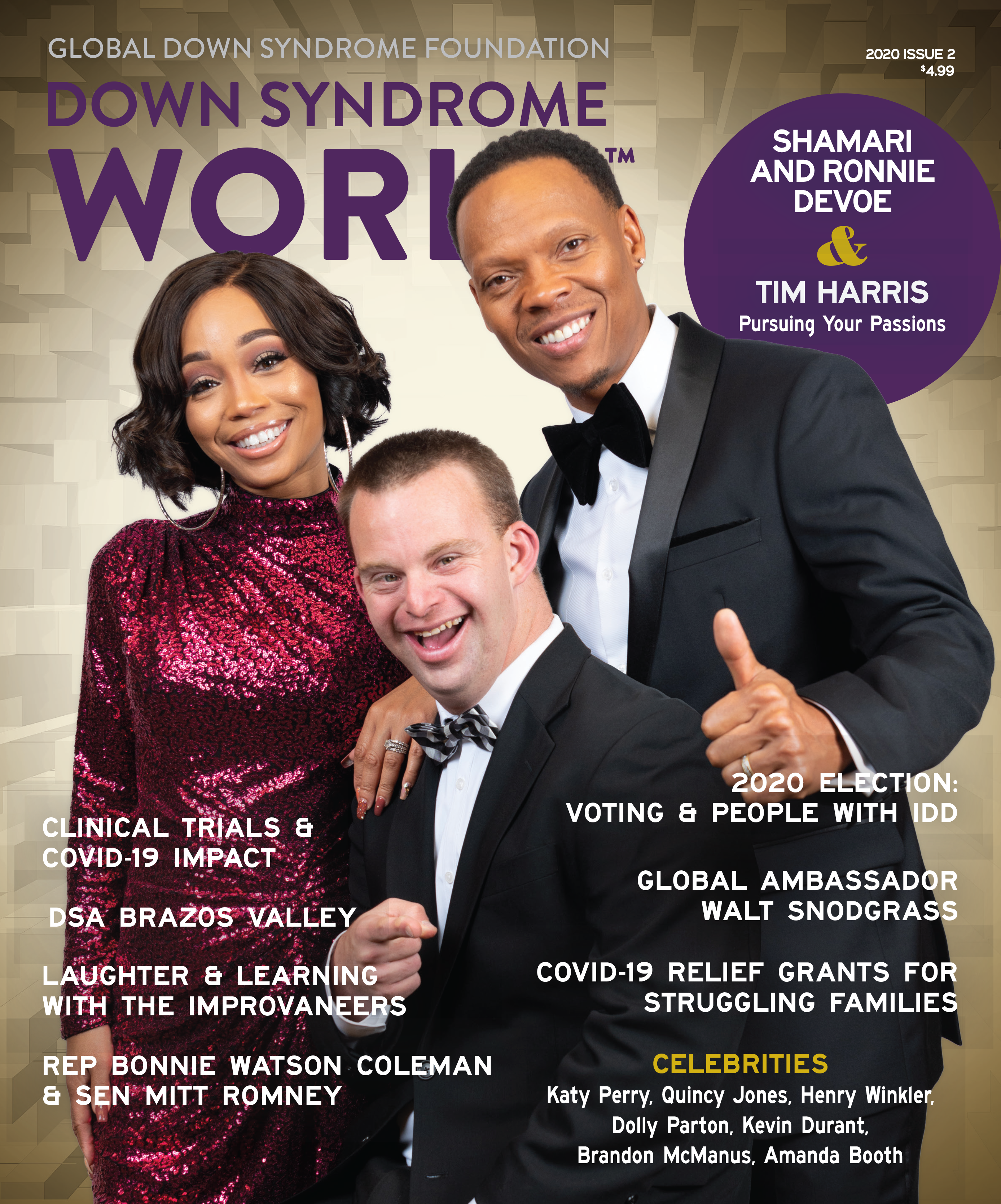
This article was published in the award-winning Down Syndrome World™ magazine. Become a member to read all the articles and get future issues delivered to your door!
CONTRIBUTING IN A MEANINGFUL WAY to the body of science and medical practice surrounding an unprecedented world-wide pandemic is not something most people ever get the opportunity to do. It certainly was not what Executive Director of the Linda Crnic Institute for Down Syndrome, Dr. Joaquín Espinosa, and his team of scientists were thinking about in early March 2020.
During this time, the University of Colorado Anschutz Medical Campus (CU) shut down all research operations, locking scientists out of their buildings and laboratories in response to and to prevent the spread of the novel coronavirus (COVID-19) pandemic. Thankfully, Dr. Espinosa and the Crnic Institute team had their valuable experiments and supplies already gathered and stored away safely. With numerous grants from the National Institutes of Health (NIH), the National Science Foundation, and others, the team had plenty of work that could be performed remotely – analyzing data, writing up results for scientific journals, and preparing new proposals for funding.
Their biggest worry was something they could not work on remotely – the delay of their NIH clinical trial grant to treat autoimmune diseases in people with Down syndrome. In 2016, shortly after launching the Crnic Institute Human Trisome ProjectTM (HTP), the Crnic Institute made one of the most important scientific discoveries – Down syndrome can and should be characterized as an immune system disorder.
In particular, they discovered that an immune system pathway called the “interferon pathway” was “lit up” in people with Down syndrome pretty much 24/7, versus in typical people where it is only turned on when they are fighting a virus or infection and then it turns off.
The constant taxation of the immune system in people with Down syndrome creates low intensity inflammation that over time probably contributes to the co-occurrence of various diseases, including dementia. The Crnic Institute discovery was even more consequential because there are FDA-approved drugs that turn down the interferon pathway in typical people. Crnic Institute scientists were about use one of these FDA-approved drugs, a JAK inhibitor called tofacitinib, in an unprecedented clinical trial for adults with Down syndrome when the pandemic forced lab closures around the world.
AN “AH HA” MOMENT
As serendipity would have it, two days into quarantine, the Crnic team was doing a quick review of the research literature on COVID-19. Their findings revealed something that was both shocking and yet made perfect sense – it appeared that hospitalized COVID-19 patients were displaying many of the same patterns of immune system dysregulation that the Crnic Institute team had spent years studying, analyzing, and annotating in people with Down syndrome.
In COVID-19, the body’s antiviral defense system, which utilizes the interferon pathway, is sent into overdrive, causing the release of high levels of inflammatory signaling molecules known as cytokines. In COVID-19 and other viral infections, this “cytokine storm” is associated with respiratory distress, heart damage, and higher mortality rates. Similarly, people with Down syndrome have higher-than-normal levels of interferon signaling and often display more of a mini cytokine storm, even without a viral infection. Crnic Institute scientists believe this could contribute to many of the hallmarks of and co-occurring medical conditions associated with Down syndrome and are working to understand those connections.
Within a week, Dr. Espinosa and the Crnic Institute were one of a handful of research teams allowed back, with COVID-19 safety measures, into their labs to work on COVID-19 treatments for the general populations and to understand the connection and possible affects and treatments on people with Down syndrome.
Today, Dr. Espinosa is the leader of an international consortium looking at JAK inhibitors to treat COVID-19. The treatment is one of several clinical trials that Dr. Anthony Fauci, Director of the National Institute of Allergy and Infectious Disease at the NIH, has been supporting in the United States. The international consortium includes labs from the United States, China, Italy, France, Spain, Argentina, Mexico, Canada, Germany, and Denmark.
COVID-19 COULD BE MORE SEVERE FOR PEOPLE WITH DOWN SYNDROME
In reviewing the COVID-19 literature, Crnic Institute scientists also realized that people with Down syndrome should probably be considered a “high-risk” group for COVID-19. “High risk” means a person who gets COVID-19 has a higher probability of experiencing more severe illness than a member of the general population without other risk factors. This idea rests on the basis that the strength of the cytokine storm in COVID-19 correlates with disease severity and outcomes, and that people with Down syndrome will be more likely to develop a stronger, more prolonged cytokine storm due to higher levels of baseline interferon signaling. Although the direct studies of COVID-19 in Down syndrome needed to prove or disprove this idea have not yet been performed, ample supporting evidence already exists in the context of other viruses and in our basic understanding of immunology in Down syndrome.
It is also important to consider that people with Down syndrome have increased susceptibility to bacterial pneumonia. Although seemingly unrelated, it has been well documented that pandemics of respiratory viral infections are followed by a surge in cases of bacterial pneumonia, and that a large portion of deaths are actually attributed to secondary bacterial infections. Children with Down syndrome have much higher rates of viral pneumonia and bacterial pneumonia, with the latter being a leading cause of mortality in adults. Taken together, these known phenomena suggest that a person with Down syndrome who contracts COVID-19 would have an increased risk of also acquiring bacterial pneumonia.
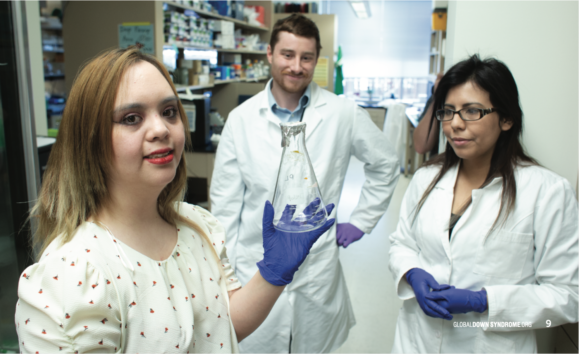
PUTTING TOGETHER ALL THE EVIDENCE:
#1 – People with Down syndrome have higher levels of interferon signaling.
#2 – Once infected, people with Down syndrome have an increased risk of experiencing a stronger cytokine storm and thus a more severe case of COVID-19.
#3 – Both during and after infection with SARS-CoV-2, people with Down syndrome will be more likely to also contract bacterial pneumonia.
It is important to note that these are hypotheses and predictions based on existing evidence outside of COVID-19 and should be taken into consideration with caution. The studies needed to fully understand COVID-19 in people with Down syndrome are still just starting to get underway. The good news is, there are people with Down syndrome, with and without underlying conditions, who are surviving COVID-19. We simply need more data and to better understand this virus before we can definitively come to conclusion.
HOW DOWN SYNDROME RESEARCH FROM THE CRNIC INSTITUTE IS BEING UTILIZED TO STUDY AND TREAT COVID-19
Since March, every member of Dr. Espinosa’s team, from the basic scientists to the clinical researchers, and even the administrators, have been utilizing their unique skills and knowledge gained while working in Down syndrome to rapidly advance COVID-19 research at CU.
For example, Crnic Institute scientists immediately started testing potential therapeutics for the COVID-19 cytokine storm in their mouse model of Down syndrome, nicknamed Dp16. They weren’t actually exposing the Dp16 mice to SARS-CoV-2; they didn’t need to. Instead, the scientists could activate the immune system and stimulate a cytokine storm much like what is seen in COVID-19, simply by using a molecule that tricks the immune system into sensing a virus when there isn’t one. Crnic scientists then treat the mice with JAK inhibitors targeting the interferon signaling pathway that is chronically activated in people with Down syndrome and that drives the cytokine storm in COVID-19. The data resulting from these experiments will be extremely valuable because it can be interpreted and utilized in two contexts: COVID-19 and Down syndrome.
FIGHTING COVID-19 TOGETHER
Who would have ever guessed that Down syndrome research and the discovery that interferon signaling is chronically activated in people with Down syndrome would one day so greatly impact the science and research behind a historic, global pandemic? This meaningful contribution to the body of science and medical practice surrounding COVID-19 is something the Down syndrome community should be proud to be part of. Together, this community of researchers, self-advocates, families, and supporters can clearly make positive scientific impacts not only for people with Down syndrome, but also for the entire world.
THE CRNIC INSTITUTE HUMAN TRISOME PROJECTTM IN ACTION AGAINST COVID-19
At the beginning of the quarantine, CU assembled a centralized team tasked with rapidly creating a biobank to collect blood and other biological samples from COVID-19 patients. These samples would then be administered to researchers with approved projects. This model essentially replicates one of the Crnic Institute’s flagship research initiatives, the Crnic Institute Human Trisome ProjectTM (HTP). The HTP is generating multiple layers of “omics” data (think big data from sequencing all of someone’s DNA and RNA and measuring all their proteins, metabolites, immune cells, and much more) on hundreds of people with and without Down syndrome in order to understand the hallmarks of and co-occurring medical conditions associated with Down syndrome. Having heard about the Crnic Institute’s HTP and Biobank, the CU COVID-19 team reached out to Crnic scientists to tap into their expertise. The Crnic team shared detailed protocols and helped advise the CU team during the development of the CU COVID-19 Biobank.
As part of a synergized endeavor with the COVID-19 Biobank, leading researchers at CU also partnered with Dr. Espinosa and the Crnic team to replicate the experimental platform from HTP and apply it to COVID-19. The parallel effort by CU to apply the HTP platform to COVID-19 has been aptly dubbed “The COVIDome Project,” and Crnic scientists are leading the ongoing data generation to advance COVID-19 research for better diagnostics and therapeutics.
The Crnic team is also partnering with a national COVID-19 collaborative group to specifically study COVID-19 in people with Down syndrome. As explained earlier in this article, so much is yet unknown about COVID-19 in Down syndrome and numerous studies are needed to understand its impacts. The team is working with top data scientists at CU to identify differences in risk factors, symptoms, clinical course, immunological parameters, response to various treatments, and outcomes and long-term effects of COVID-19 in people with Down syndrome. Alongside these efforts, the Crnic team is also studying individuals with Down syndrome who have recovered from a SARS-CoV-2 infection as part of the HTP, in order to assess changes induced by COVID-19 across all the layers of omics data. Together, Crnic scientists hope these efforts will advance our understanding of interferon signaling and the cytokine storm in COVID-19 and Down syndrome and
inform the development of customized preventative and therapeutic solutions.

Like this article? Join Global Down Syndrome Foundation’s Membership program today to receive 4 issues of the quarterly award-winning publication, plus access to 4 seasonal educational Webinar Series, and eligibility to apply for Global’s Employment and Educational Grants.
Register today at downsyndromeworld.org!
Global Honors Supermodel Amanda Booth with Quincy Jones Exceptional Advocacy Award
November 15th, 2019 by Global Down Syndrome Foundation

From Down Syndrome WorldTM 2019 Issue 3 of 4
What happens when a supermodel has a baby with Down Syndrome? Well, she gets him a modeling contract too (obviously)!.
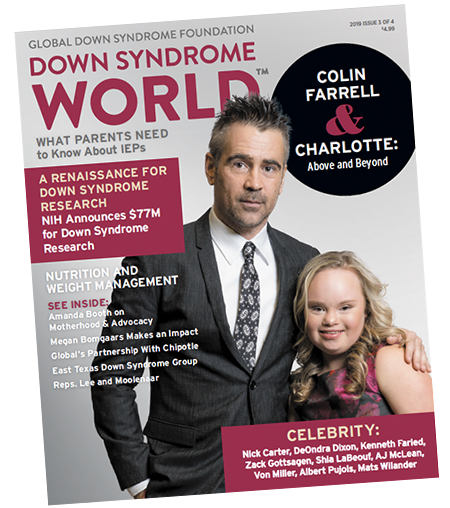 This article was published in the award-winning Down Syndrome World™ magazine. Become a member to read all the articles and get future issues delivered to your door!
This article was published in the award-winning Down Syndrome World™ magazine. Become a member to read all the articles and get future issues delivered to your door! AMANDA BOOTH TRAVELS the world for her career, modeling in fashion editorials and advertising campaigns for companies and publications such as Italian Vogue, Lancôme, Elle, Target, and more. She also has appeared in network television shows such as “Community,” “Hot in Cleveland,” and “Maron.” Yet, Amanda credits her greatest journey to one that takes place right in her own home: parenting her son, Micah, who happens to have Down syndrome. In 2014, Amanda and her husband, Mike, became first-time parents, with all the same questions and fears new parents typically have, plus one that took them by surprise: What is Down syndrome?
The couple embraced Micah from the beginning, and by the time he was 2 years old, his mom had already secured him a modeling contract as well — an act of a mother ’s love but also an act of advocacy for people with Down syndrome in the modeling industry. “We wanted to show the world how beautiful Down syndrome is,” says Amanda.
“We wanted to show the world how beautiful Down syndr ome is,” says Amanda.
Amanda started to share her inspiring journey of motherhood on her social media accounts @lifewithmicah and @amanda_booth. Micah’s story then spread to magazines and online publications, ranging from feature stories and interviews with journalists to guest blogs and articles written by Amanda herself. The mother and son pair have been featured in Harper’s Bazaar US and Australia, Glamour Magazine UK, Mother’s Magazine, Down Syndrome World, The Mighty, and more. Most recently, in September, they were on the cover of Vogue Living Netherlands, making Micah the first person with Down syndrome to be featured on a Vogue magazine cover.
Amanda has used her modeling for fashion retailer Anthropologie to promote Global as well. As the face of the mega brand’s Mother’s Day campaign, Amanda helped raise thousands of dollars for Global’s research and medical care. This year, Amanda will be awarded Global’s prestigious Quincy Jones Exceptional Advocacy Award at the Be Beautiful Be Yourself Fashion Show, the largest fundraiser for Down syndrome in the world.
A PERSONAL JOURNEY OF LIFE, LOVE & ACTIVISM
Amanda and Mike did not learn that Micah had Down syndrome until he was 4 months old.
“I had never met someone with Down syndr ome before. We had a lot of fears, questions, and concerns about what that meant.”
About three years later, Micah received the dual diagnosis of Down syndrome and autism. “Because we got to know Micah as Micah first, his official diagnosis didn’t feel heavy. Ultimately, it was just words on a piece of paper. He was still our funny, lively boy who we love and care for.”
Mike, who is extremely supportive of Amanda’s advocacy, agrees.”
“We believe that Micah will ha ve a wonderful, full life. But we do need to make sure he has access to ex cellent health care.”
Micah was born with hypothyroidism and a very weak immune system. As a result, his interactions with the outside world were limited, and his growth and development were stunted.
“It wasn’t until Micah’s pediatrician looked beyond the fact that it was typical for kids with Down syndrome to have a weak immune
system and instead addressed Micah’s health in a more adequate way that he started to get better,” Amanda remembers.
After receiving the correct diagnosis and taking proper medications, Micah’s health was thriving.
“It’s not enough to accept that certain things happen as a part of a condition like Down syndrome. The key to our children’s future is understanding why and how we can help them receive excellent medical care.”
Amanda says their advocacy work happened very organically.
“We already had been given this large platform through my career and social media,” says Amanda, whose Instagram accounts have more than 150,000 followers combined. “When we learned that Micah would have Down syndrome, it felt like our purpose to share our journey with the world.”
She and Mike started receiving letters from families asking questions and thanking them.
“It wasn’t until then that we started to realize how much we were actually helping families,” Amanda says. “We remember what it felt like getting the diagnosis, so we shared it all, the beautiful moments and the struggles.”
As Micah’s face became more well known in the social media and Down syndrome communities, organizations and publications began reaching out to feature their family. Amanda started writing for and being featured in parent magazines. So while working hard to be good a mother and a successful model and actress, Amanda took on another big job as an activist.
CONNECTING WITH GLOBAL
“Global really opened our eyes to the disparity in research funding for Down syndrome from our National Institutes of Health,” Amanda explains.
When Micah was still a baby, Amanda and Global’s President and CEO connected by phone and talked for over an hour, bonding immediately over their children. Later that year, Amanda, Mike, and Micah attended Global’s annual Be Beautiful Be Yourself Fashion Show, which Amanda defines as a transformational moment in their journey.
“Micah had just turned 1, and it was still a very scary time for us,” Amanda remembers. “But when we walked into the fashion show, we were surrounded by thousands of people with Down syndrome and their families who were so happy. And we met incredible leaders truly making a difference in our community.”
That year, 1,400 attendees, including Hollywood celebrities such as Hillar y Swank, Queen Latifah, John C. McGinley, and more, came to Denver for the event, raising $2 million. To date, the event has raised over $18 million for Down syndrome.
“For the first time as parents, instead of feeling scared for Micah’s future, Mike and I felt excited and hopeful.”
She realized they could help families on a larger scale, by advocating for research and medical care with Global.
The family now attends the event every year, and Amanda has been a powerful spokesperson for Global, including partnering for multiple years with retailers and influencers for Global’s Mother’s Day campaign. In 2018, Amanda was the face of Global’s Mother’s Day campaign with Anthropologie, and in 2019, she rallied the support of her tribe of mommy bloggers to help Global create a special video to pay tribute to the holiday.
In addition to supporting Global’s work, Amanda has been heavily involved with other nonprofits, such as Ruby’s Rainbow and Changing the Face of Beauty.
WHAT’S NEXT?
“I’m just a mom who loves my son and wants the best life for him,” Amanda states. “I want other people to see my son the way I see him. Every person deserves to feel like they belong.”
Amanda will receive Global’s prestigious Quincy Jones Exceptional Advocacy Award along with co-awardee Megan Bomgaars at the 2019 fashion show in November. After learning of Megan’s accomplishments as an entrepreneur, TV star, and public speaker and seeing her high-fashion makeup line photos, Amanda is very excited to meet Megan and talk about their shared mission of inclusion and equality.
“I want to thank the parents before us who fought hard for our kids. People with Down syndrome are slowly being accepted into society, able to attend public school, have careers, and get married. I want to thank Global for ensuring our federal government prioritizes Down syndrome research funding to improve health outcomes,” Amanda says. “But the best way to thank them is not by saying ‘thank you’ — it’s by supporting their truly transformative, effective advocacy work.”
Like this article? Join Global Down Syndrome Foundation’s Membership program today to receive 4 issues of the quarterly award-winning publication, plus access to 4 seasonal educational Webinar Series, and eligibility to apply for Global’s Employment and Educational Grants.
Register today at downsyndromeworld.org!
The Salah Foundation Gifts $75,000 Matching Grant Toward Classes at Global’s New Education Center
November 7th, 2019 by Global Down Syndrome Foundation
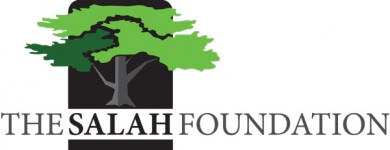
At Global’s 11th annual Be Beautiful Be Yourself Fashion Show, a surprise announcement was made by Noreen Salah Burpee, Executive Director of the Salah Foundation, and delivered by 9News emcees Kim Christiansen and Tom Green. The Salah Foundation matched $75,000 during the live auction that will go to a much-needed Computer Training Class at Global’s new Education Center that was made possible by a transformative $1 million gift from Salah Foundation in 2017.

Award-Winning Actor Colin Farrell Goes Above & Beyond for Global
November 3rd, 2019 by Global Down Syndrome Foundation
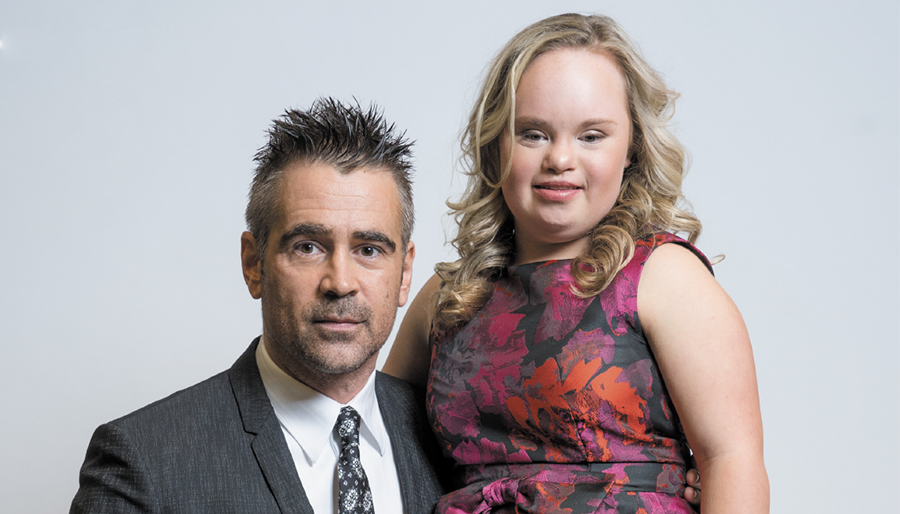
From Down Syndrome WorldTM 2019 Issue 3 of 4
Ensuring 2019 Global Ambassador Charlotte Fonfara-LaRose has a ball at the red carpet premiere of Dumbo
 This article was published in the award-winning Down Syndrome World™ magazine. Become a member to read all the articles and get future issues delivered to your door!
This article was published in the award-winning Down Syndrome World™ magazine. Become a member to read all the articles and get future issues delivered to your door! IN MARCH 2019,Charlotte Fonfara-LaRose attended the movie premiere of Tim Burton’s live-action remake of the Disney classic Dumbo as Colin Farrell’s guest. Farrell, who plays circus stalwart Holt Farrier in the film, says, “I was so happy to see Charlotte again at the premiere, and I hope to see her again soon!”
Charlotte assures us the feeling was mutual.
“I felt like a celebrity on the red carpet — he totally remembered who I was and gave me a hug!”
Other cast members in attendance included Michael Keaton, Danny DeVito, Eva Green, and Alan Arkin. As for hanging out with other celebrities on the red carpet like Helen Mirren, Charlotte exclaims, “It was so exciting!”
This amazing opportunity stemmed from Farrell’s generous live auction donation at the Global Down Syndrome Foundation’s 10th Anniversary Be Beautiful Be Yourself Fashion Show in 2018, where Charlotte was a model and Farrell was an awardee. This year, Charlotte has been chosen as the 2019 Global Ambassador where she and her family will be honored at Global’s marquee annual fundraiser.
MEET CHARLOTTE FONFARA-LAROSE
The 16-year-old firecracker was named after her maternal grandmother, Charlotte. Charlotte is a natural activist who loves to help people.
“I help anyone feeling sad feel better by giving them a hug,” she says.
Cathy Fonfara and Scott LaRose had Charlotte in 2003. The young new parents did not learn Charlotte would have Down syndrome until she was born, causing quite a shock. However, both Cathy and Scott come from large dedicated families, who rallied in support of their beautiful new addition to the family.
“Her birth made us want to be better people, and we wanted better for her,” says Cathy. “She is really the reason that we have such a great relationship and that we are a loving family together.”
Scott recalls that his father, who was an engineer and probably knew the least about Down syndrome in the whole group, came to them two days after Charlotte’s diagnosis with a binder of information.
“It was a very touching way to approach things, and I think it certainly helped us dig in a little bit,” Scott tells.
Sixteen years later, the family remains close. The Fonfara and LaRose families have a unique arrangement that works well for them and gives Charlotte lots of quality time with her large extended family.
“Scott and I are no longer a couple, but we are a family and we will always be a family,” says Cathy. “We vacation together, we go out to dinner as a family, and we spend every holiday together as a family.”
Charlotte lives full time with her mom and 8- year-old sister, Noelle, in Annapolis, Maryland. Scott is a ver y attentive father who is involved in every aspect of Charlotte’s life. Charlotte also has special relationships with both her grandmothers: Cathy’s mom, whom she calls “Oma,” and Scott’s mom, whom she calls “ Gigi.”
Charlotte is an inspiration to her family and a role model to her little sister, classmates, and peers. She doesn’t let Down syndrome get in the way of pursuing her dreams, and she lives her life as any typical 16-year-old. She loves horseback riding, swimming, paddleboarding, and traveling. In fact, she’s traveled to over 30 states and 10 countries with her family! She has a boyfriend named Zach, whom she has known since childhood, and they love going on sushi dates. Charlotte has dreams of owning a bagel shop one day, marrying Zach, and living in a blue and red home together.
Charlotte has inspired her mom into action.
“Over the years Charlotte has shown me that all she needs is what all children need: love, support, and encouragement,” says Cathy. “She also has helped me to educate doctors, teachers, and school administrators about the ability and potential of people with Down syndrome.”
GLOBAL’S 2019 AMBASSADOR
This year, Charlotte and her family are thrilled to be named an Ambassador family at the 2019 Be Beautiful Be Yourself Fashion Show. The event is the largest fundraiser for Down syndrome in the world. Over 1,400 self-advocates, families, Hollywood and sports celebrities, community philanthropists, and government leaders attend each year.
Charlotte and her family are no strangers the star-studded evening, though. Cathy and Charlotte were introduced to Global when Zach was in Global’s Washington, D.C. Gala in 2013. Charlotte and Zach danced on the runway together during a performance by Sheryl Crow!
“When we attended our first fashion show, we were astounded by the effort, quality, and attention that Global put into providing such a beautiful and festive event to showcase the beauty of individuals with Down syndrome,” says Cathy.
While she is always impressed by the famous and influential people who come out to support the show every year, Cathy is clear.
“The best part is when the models walk the runway, unintentionally stealing the spotlight from those celebrities escorting them,” she says. “The pride and joy on the models’ faces is indescribable and inspiration is palpable.”
Charlotte and her family have now attended seven Global fashion shows.
COLIN FARRELL’S SPONTANEOUS AND IMPROMPTU GENEROSITY
In 2018, at Global’s 10th Anniversary Be Beautiful Be Yourself Fashion Show, guests went wild for the 25 models with Down syndrome, including Charlotte. They were also brought to their feet by two inspiring recipients of Global’s Quincy Jones Exceptional Advocacy Award — Zack Gottsagen and Colin Farrell.
Farrell is an award-winning Irish actor and activist. He received his first Golden Globe for In Bruges and was nominated for multiple awards for his performance in The Lobster, starring opposite Rachel Weisz. More recently he has star red in the Harry Potter spin-off prequel, Fantastic Beasts and Where to Find Them, The Killing of a Sacred Deer with Nicole Kidman, Roman J. Israel Esq. with Denzel Washington, and the Disney live-action film Dumbo directed by Tim Burton.
Farrell uses his public platform to support organizations he is passionate about. He serves a celebrity partner for the United Nations’ World Food Programme, was an official spokesperson for the Special Olympics World Games in Shanghai, and supports nonprofits focused on the differently-abled community in tribute to his son, James.
As a father to a son with Angelman syndrome, Farrell has supported the Foundation for Angelman Syndrome Therapeutics for over a decade. He credits his son with making his life more meaningful and fulfilling.
“James’ very existence has changed so much about my life and how I preserve my own life selfishly being a caretaker and having the gift of being a protector and a provider for James, and as someone who loves him endlessly, someone who has watched his growth from infant to child to teenager now and approaching his young manhood,” he says. “James’ strength and bravery, his individuality and yet his commonality are things I’m constantly struck by.
“And, of course, as a result of his existence, it has afforded me the great gift of being involved in the lives of other families who care for a child who is differently-abled,” Farrell continues. “I’ve been touched by and allowed to be close to families who share the struggles of just being a par ent first and foremost but also the extra struggles that can arise from being a parent of a child who is differently-abled. James’ enrichment of my life is beyond measure.”
Indeed, James and his work benefiting the differently-abled brought Farrell to Denver last year to receive Global’s highest honor. During the fashion show’s live auction, Farrell jumped up on stage alongside Jamie Foxx, Jeremy Renner, Von Miller, and John C. McGinley and spontaneously offered a trip to Hollywood and tickets to the premiere of Dumbo. Impressed and moved by Farrell’s generosity, Charlotte and her mom decided to bid on the tickets, and they won!
At the fashion show, Farrell took photos with Charlotte and all the models with Down syndrome, and spoke to reporters on the red carpet.
“Seeing all of the members of the community walking down the runway and seeing how much they were empowered, and how the models and every single person in the audience was enraptured, seeing this as an indelible moment and celebration of their lives, and their brilliance as human beings and spirits both individually and as a community, was extraordinarily enriching and also emboldening to observe,” Farrell says.
“What a class act to not only support Global with his presence at the gala but to also offer an ex citing item to raise more money,” says Cathy. “And then be so down to earth and caring to make my sweet Charlotte feel so special.”
FIGHTING DISCRIMINATION AND OVERCOMING CHALLENGES — A REWARDING LIFE
Thousands of guests travel from all over the world to see Global’s iconic fashion show, where models with Down syndrome rock the runway with their celebrity escorts. The evening gives attendees an opportunity to learn, network, and support Global’s work. Through ticket and table purchases, model sponsorships, silent and live auction bids, and general donations, the proceeds from Global’s Be Beautiful Be Yourself Fashion Show benefit their affiliates’ important work in research and medical care.
“The underlying theme of the fashion show is actually human and civil rights, and our event gets to flip an old, negative paradigm on its head,” says Michelle Sie Whitten, President and CEO of Global. “From very active members of the Global community to people who are completely new to Down syndrome, everyone leaves feeling they are a part of something bigger than themselves.”
Charlotte’s family agrees.
“We’ve faced some heartbreaking discrimination in the education system, with teachers creating restrictive learning environments and blatantly excluding kids with special needs,” says Cathy. “One of the many great things that Global does is helping every individual with Down syndrome with education from academia to life skills. They work with parents and their children on their IEPs (individualized education programs), and they are now developing an education center at their new headquarters to focus on vocational training.”
Global aims to show the world that people of all abilities , like Charlotte and James, should have the opportunity to reach their full potential and live happy, rewarding lives.
“Educating our medical professionals and our community is important,” says Farrell. “Imagine you are told your child may never walk and then you see your child take his or her first steps a couple of weeks short of their fourth birthday like James did. The profundity and the emotional magnitude are overwhelming and must be shared with others to educate how y our child’s future is communicated. So there will be great challenges with your child like any child, but the rewards can be unimaginable and even more magnified.”
WORKING HARD TO CREATE HEALTHY LIVES
Global’s Ambassadors and models help raise awareness and advocate for people with Down syndrome to have equal access to transformative research, lifesaving medical care and other opportunities. And who’s at the top of Global ’s contact list for this? The U.S. government. Down syndrome has been one of the least-funded genetic conditions by the National Institutes of Health (NIH) for nearly 20 years, despite being the leading cause of developmental delay in the U.S. and the world.
Angelman syndrome is also a genetic condition. Farrell says that although he was saddened to learn about this disparity in funding, he wasn’t surprised.
“I think maybe the reason for this is a bittersweet one,” Farrell says. “Because people with Down syndrome are often presented as loving and happy, members outside of the community may think there’s no help needed. And it’s our job to teach others that people with Down syndrome need specialized medical care and research and, frankly, help throughout their lives and raise awareness.”
Farrell is optimistic about the progress in research for various genetic conditions “It’s an exciting time in science, and the future is looking brighter for our children than ever before.”
Over a decade of Global lobbying Congress and collaborating with the NIH has resulted in a tripling of the NIH’s Down syndrome research budget, from $27 million in 2016 to $77 million in 2019.
“Through Global, we have come to understand that people with Down syndrome have a different disease profile and that they need specialized medical care throughout their lives,” says Scott. “I was shocked to learn that there are no updated, evidence-based medical care guidelines for adults with Down syndrome. We are hugely grateful to Global and the experts who are working to create those for Charlotte and our community.”
“Global’s amazing work in advocacy, medical care, research, and government legislation will help my daughter and others with Down syndrome be able to live the lives they want and the lives all parents wish for their children,” says Cathy.
“Global’s work is so important because they help find the best treatments for people with Down syndrome who are sick,” Charlotte adds.
The connections between Down syndrome and cancer research are particularly important to the family. In 2016, Charlotte’s friend Mary Miller was diagnosed with leukemia. Charlotte and Mary, both born with Down syndrome, have been friends since appearing as models in Global’s 2014 Be Beautiful Be Yourself Fashion Show. Motivated by Mary’s fight against leukemia and their desire to fund critical Down syndrome research, Cathy and Scott funded a Basic Science Grant to Joaquín Espinosa, Ph.D., and his team at the Linda Crnic Institute for Down Syndrome at the University of Colorado Anschutz Medical Campus. Additionally, Charlotte’s grandmother Gigi has cancer, and as always, the family is supporting her every step of the way.
“Charlotte has a heart of gold and is already a champion for others who are sick or who she feels are disadvantaged in some way,” says Cathy. “She was just born that way, and we can’t wait to see what challenging projects and work she will take on going forward.”
“As a parent, Charlotte is my number one priority,” says Scott. “I want to make sure she receives everything she needs to reach her potential. By supporting Global, we have the luxury of not only helping Charlotte, but helping all people with Down syndrome and that’s an amazing feeling.”
Charlotte will be featured at Global’s Be Beautiful Be Yourself Fashion Show on Saturday, Nov. 2. Farrell encourages everyone to support her.
“I would recommend anyone who gets a chance to support Global and the Be Beautiful Be Yourself Fashion Show in Denver try and make the trip. Charlotte and everyone with Down syndrome deserve your attention. The event itself is love, community, harmony, unity, and unbridled hope for our future.”
“Whether she is being poked and prodded for medical tests, being underestimated by teachers at school, or having people staring at her as she walks down the street, Charlotte has always been brave, resolute, and true to herself. She is truly a great role model and Ambassador.”
Charlotte is excited to apply her strength and passion to her new role with Global.
“As Global’s Ambassador, I hope to help other people with Down syndrome be healthier through medical research, to bring attention to Global’s mission, and to bring respect to people with Down syndrome.”
Like this article? Join Global Down Syndrome Foundation’s Membership program today to receive 4 issues of the quarterly award-winning publication, plus access to 4 seasonal educational Webinar Series, and eligibility to apply for Global’s Employment and Educational Grants.
Register today at downsyndromeworld.org!
Understanding Behavioral Challenges
September 19th, 2019 by Global Down Syndrome Foundation
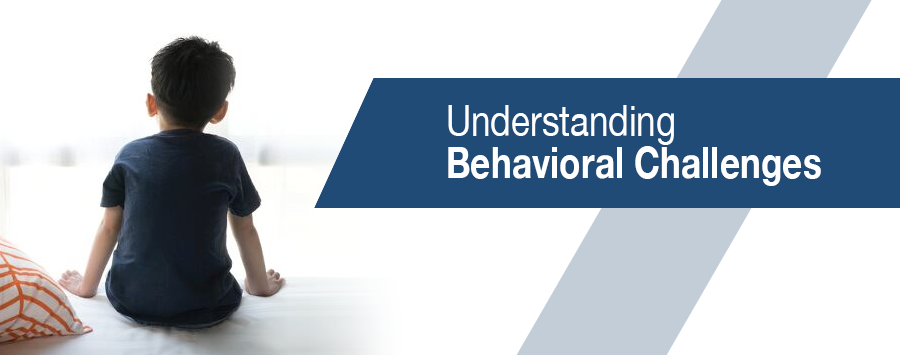
An important study in the journal of mental health research in intellectual disabilities shows that children with Down syndrome demonstrate increased behavioral issues compared with their typical peers. Early intervention and a development strategy can help.
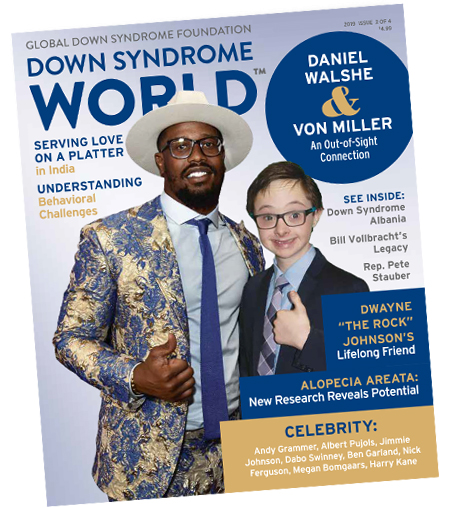 This article was published in the award-winning Down Syndrome World™ magazine. Become a member to read all the articles and get future issues delivered to your door!
This article was published in the award-winning Down Syndrome World™ magazine. Become a member to read all the articles and get future issues delivered to your door! A STUDY CONDUCTED by doctors at the Anna and John J. Sie Center for Down Syndrome at Children’s Hospital Colorado, an affiliate of the Global Down S yndrome Foundation, found that 94% of children with Down syndrome experienced one or more behavioral challenges on a w eekly or even daily basis. These behaviors include wandering off, refusal to follow instructions, aggression, impulsivity, and difficulty transitioning from activity to activity. Behavioral challenges can not only impact a child’ s quality of life but also cause major str esses for parents, teachers, and other caregivers.
In the study, Lina Patel, Psy.D., and her three co-authors, Kristine Wolter-Warmerdam, Noel Leifer, and Francis Hickey, M.D., analyzed current tools for measuring behavior in children with Down syndrome to determine which methods were effective and which could be improved upon. They also surveyed parents to learn about which behaviors were the most common and if any challenges shared a common denominator. The doctors published their results in late 2018.
Children with Down syndrome have many positive behavioral traits, and typical children certainly have negative behavioral issues. However, because of lack of research, behavior issues in children with Down syndrome are less understood. Behavioral challenges can hamper a child’s ability to function independently, perform well in school or other social settings, and even handle everyday tasks, such as bathing and dressing, at home. By understanding what can trigger certain behavioral issues, parents and teachers can better develop strategies to intervene before issues progress.
COMMUNICATION TOOLS: A COMMON DENOMINATOR
A variety of factors may fuel undesirable behaviors, according to Dr. Patel, lead author and D irector of Psychology at the Sie Center.
“I feel like motivation is a key factor,” Dr. Patel says. “It doesn’t mean that children with Down syndrome are unmotivated. It might just mean they are motivated by their own interests versus the task at hand, which then may result in behavioral challenges.”
Dr. Patel and her co-authors wanted to know which behaviors parents of children with Down syndrome found most concerning. They asked parents of 274 children seen at the Sie Center from 2010 to 2015 to fill out a specially designed questionnaire. On the questionnaire, parents were asked to state the frequency with which 16 behavior challenges occurred and their level of concern about each. Parents could also name additional behavioral challenges not listed on the form. The study is one of the largest of its kind and the results were not completely anticipated.
Noncompliance, wandering, sitting down and refusing to move, and aggression were the most common difficult behaviors parents reported. The amount and frequency of challenging behaviors was much higher than previously reported in scientific literature, with nearly 100% of parents noting the existence of challenging behaviors at least weekly.
“The most striking result we found was the frequency of behavioral challenges,” Dr. Patel says. “I think we did capture a wider array of behaviors, resulting in a higher percentage of children experiencing those behaviors. The good news is that many of the behavioral challenges that we assessed can be addressed using behavioral strategies that are informed by neurodevelopment.”
Neurodevelopment is the brain’s development of neurological pathways that influence areas including memory, intellectual functioning, attention, and focus.
The researchers also wanted to determine if any of these behavioral challenges shared a common denominator. They found that the inability of a child to effectively communicate his or her wants and needs was associated with many behavioral challenges.
“Behavior is a form of communication people use when they do not have access to other methods of communication, like verbal communication,” Dr. Patel explains. “Therefore, it’s not surprising that individuals with Down syndrome would have more behavioral challenges if they do not have more functional communication strategies.”
TAKE ACTION EARLY
The longer parents allow unwanted behaviors to persist, the more ingrained these behaviors may become.
“Behavioral interventions can make a difference and really change behavior,” says Elise Sannar, M.D., Assistant Professor of Child and Adolescent Psychiatry at Children’s Hospital Colorado. “If [parents] just live with [a behavior], it’s definitely not going to get better. If kids with Down syndrome learn that if they have a tantrum or refuse to move, they’ll get what they want, that will be reinforced, and they’ll continue to engage in that behavior.”
When concerning behaviors arise, parents should notify their child’s pediatrician or primary care physician as soon as possible so medical causes can be ruled out. Many behavior issues can be triggered by medical ailments to which children with Down syndrome are more predisposed. One such medical ailment is obstructive sleep apnea, which is found in up to 70% of children with Down syndrome.
In addition, parents should pay attention to the context of behavioral challenges — when, where, and with whom they occur, and what happens before and after them, says Anna Esbensen, Ph.D., Associate Professor, Research Director at the Jane and Richard Thomas Center for Down Syndrome in the Division of Developmental and Behavioral Pediatrics at Cincinnati Children’s Hospital Medical Center.
These clues can provide important information about why behaviors occur. Parents who are concerned about a behavior that happened when they weren’t around can ask their child’s friends, teacher, or employer for information about what took place.
“Teaching the child a replacement behavior or a different way of achieving or communicating their needs are helpful ways of teaching an adaptive … method of achieving their desired function,” Dr. Esbensen explains.
She continues, “Once we understand the function of the child’s behaviors, there are evidence-based strategies that can be used to modify that behavioral challenge.”
According to Dr. Sannar, one such strategy is applied behavior analysis (ABA), which uses a variety of techniques, such as positive reinforcement, to increase helpful behaviors and decrease damaging ones. ABA can be effective in children with Down syndrome, autism, and other conditions associated with behavioral challenges.
For example, Dr. Patel says, ABA can be used to stop a child with Down syndrome from running or wandering away from caregivers, also called elopement. A behavioral analyst can collect data to better understand why the child is eloping — is he or she bored, trying to avoid a difficult task that is hard, or eager for attention? Once the analyst has an answer, he or she can create a plan to address it. For example, if the child is avoiding work that feels too hard, the analyst can slowly increase a task’s difficulty or teach the child to ask for a break.
Helping people with Down syndrome manage behaviors is important, not only for their success in school and social situations but also as they enter adulthood, says Dr. Patel.
“Many individuals with Down syndrome who have the skill to seek employment may not be able to if they have behaviors that interfere with their job,” she advises. “It may be more difficult to gain independence with things like staying home alone or even living with others if these behaviors are not addressed.”
While it is more difficult to change longingrained behaviors, therapies and strategies exist that help adults, and studies are starting to address this older population.
The researchers plan to develop a more comprehensive tool to capture the full range of behavioral health challenges that children
with Down syndrome experience. They hope such a tool would help pediatricians and other community providers determine when to refer children to a behavioral health specialist. Most importantly, by understanding and analyzing. these behaviors, they hope to empower both individuals with Down syndrome and their parents to take necessary actions to improve and maintain appropriate behaviors.
Like this article? Join Global Down Syndrome Foundation’s Membership program today to receive 4 issues of the quarterly award-winning publication, plus access to 4 seasonal educational Webinar Series, and eligibility to apply for Global’s Employment and Educational Grants.
Register today at downsyndromeworld.org!






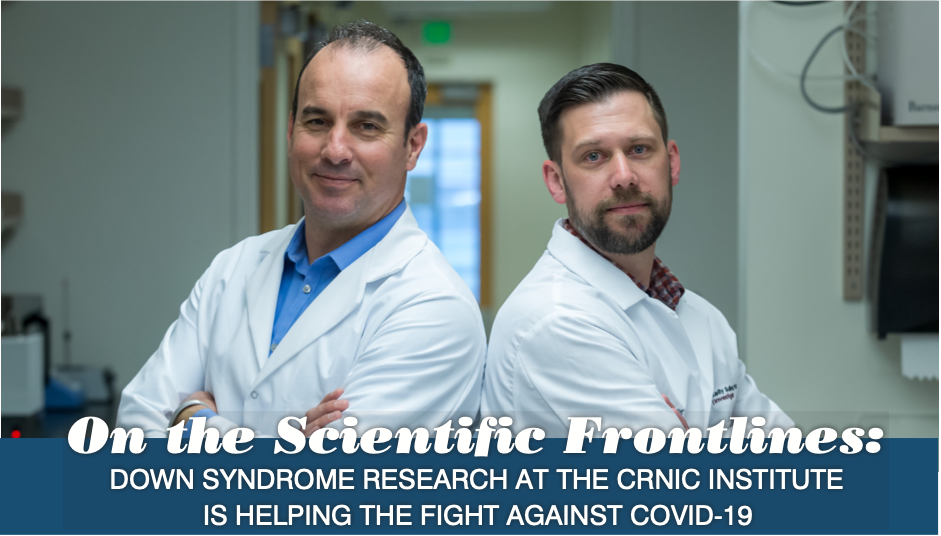
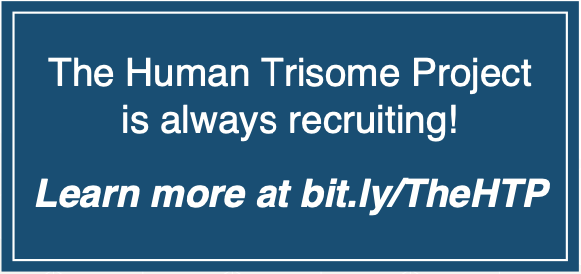
 Experience our inspirational and groundbreaking videos and photos. Our children and self-advocates are beautiful AND brilliant!
Experience our inspirational and groundbreaking videos and photos. Our children and self-advocates are beautiful AND brilliant! Make sure your local Representatives are on the Congressional Down Syndrome Task Force.
Make sure your local Representatives are on the Congressional Down Syndrome Task Force.